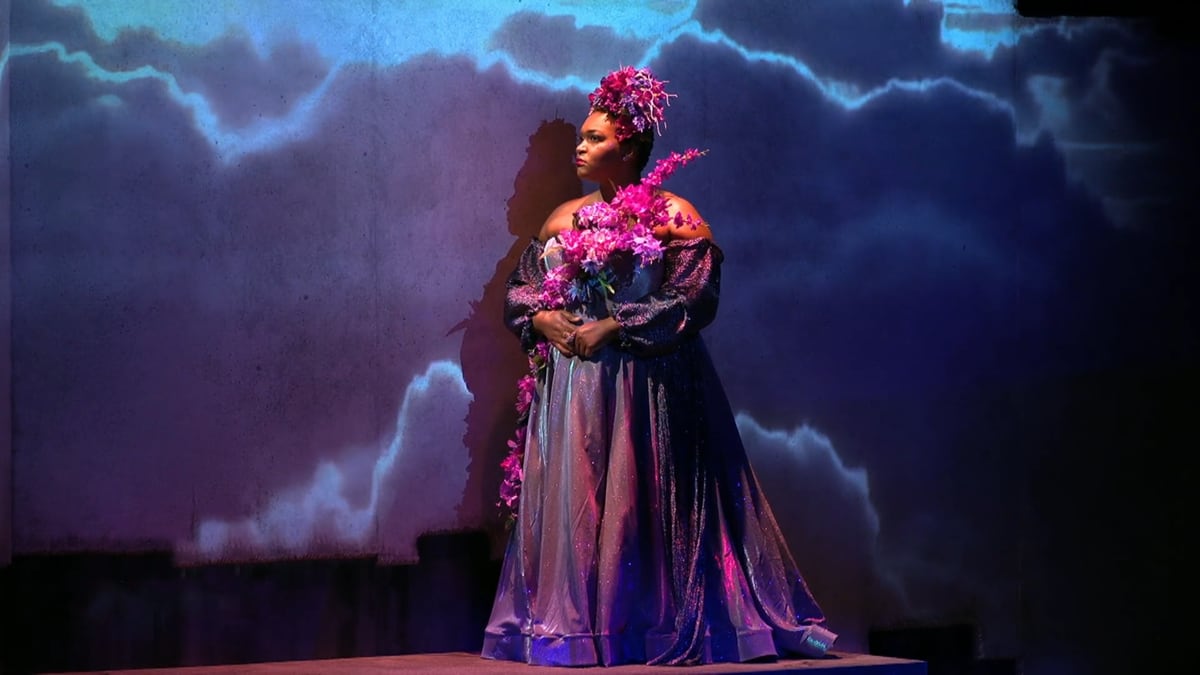A woman dressed in a white robe meets your gaze. “Pull over,” she declares. “Don’t run. Keep calm.” She speaks with clarity and confidence, making sure that you catch every syllable, but there’s weariness behind her words. You can tell that she has uttered this mantra many times.
The woman, played by Ithica Tell, is the narrator of Damien Geter’s short opera The Talk: Instructions for Black Children When They Interact With the Police. It’s one of six performances featured in Portland Opera’s Journeys to Justice, a virtual concert directed by Chip Miller that chronicles stories of Black Americans living, suffering and fighting for their right to exist.
Attempting to encompass a generations-long struggle in an 86-minute concert that cannot be performed for an audience in person is nothing if not ambitious. More than almost any other form of performance art, opera relies on the physical presence of human beings—on the reverberation of breaths and voices in vast spaces.
Without live performers and a packed house, Journeys to Justice was never going to be able to match the scope and force of a pre-pandemic opera production. Yet despite the limitations of the virtual realm—and some frustratingly literal lyrics—the concert rouses you with a cast of thunderously charismatic performers and set designer Tyler Buswell’s overpowering projections, which enhance the grief, fury and steadfast hope that course through the six pieces.
Songs for the African Violet, composed by Jasmine Barnes, begins the concert. The smooth voice of soprano Leah Hawkins carries us from the song cycle’s somber opening to a raucous conclusion punctuated by a euphoric cry—”Let your hair defy gravity!”—that stands out in a concert that often sounds like a requiem for Black lives lost across the centuries.
Journeys to Justice gazes backward and forward in time. The people killed at Mother Emanuel AME Church in 2015 Charleston, S.C., and at the 16th Street Baptist Church in 1963 Birmingham, Ala., are honored in Two Black Churches. A World War II veteran is tormented by a cop in Night Trip. The words of the Rev. Dr. Martin Luther King Jr. are repeated in Songs of Love and Justice, which pays tribute to a legend—but also embraces the possibility of a compassionate future when soprano Lynnesha Crump sings, “Love is the only force capable of transforming an enemy into a friend.”
Like history-spanning superglue, Buswell’s projections bind these stories together. The images can be chilling—like the crimson light that looms during The Talk, mimicking the deadly hue of a police light—but they can also be nourishing. Footage of rushing water surrounds baritone Michael Parham as he performs Two Black Churches, underscoring the belief that buoys the concert: Racism is as unnatural as an assembly line, while kindness flows like a stream.
While that point is made wordlessly, Journeys to Justice is not always so deft. The concert is filled with didactic declarations like, “She’s in a cycle and a system that reduces her to only stereotypes!” These lyrics communicate ideas that demand to be heard, but they explain rather than evoke. The language of opera is not a language of explanations—it’s a language of feelings, and there are many times when you wish the concert would trust us to find the meaning in the music without stating it as if it were the thesis of a research paper.
It’s understandable that Journeys to Justice would lean into literalism. When lives are at stake, there’s no time to mince words. Yet the most magnetizing chapters in the concert are the ones that ask you to lose yourself in their rhythms, like The Talk. During the piece, performers sing, “Keep your hands where they can see them,” and clap and raise open-palmed hands in the air—an image all the more haunting because its tragic implications are self-evident, not spelled out.
That moment is transfixing not only because of what it is, but because of what it is a part of. Journeys to Justice stands alongside Scott Joplin’s Treemonisha, Anthony Davis’ X: The Life and Times of Malcolm X and many other operas by Black composers that have affirmed opera can and should belong to everyone. That is why, together, the notes of the concert create something more than music. They create a new chapter in an ongoing musical revolution.
SEE IT: Journeys to Justice streams at portlandopera.org through May 31. A standard digital pass is $50, pay-what-you-will starts at $5.
